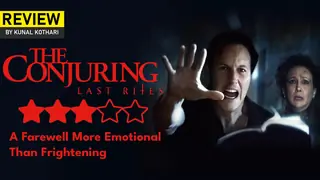Tron: Ares Review: Dazzling Visuals, Dim Story, and a Rocking Soundtrack in this Jared Leto-led Film
A predictable premise on paper, but what keeps it alive are the curveballs, the thumping visuals, and an unrelenting pace that makes the film feel like a story unfolding over a few feverish days.
Published: Friday,Oct 10, 2025 03:30 AM GMT+05:30

In theaters now
Cast: Jared Leto, Greta Lee, Evan Peters, Jodie Turner-Smith, Jeff Bridges & more
Directed by: Joachim Rønning
Rating - *** (3/5)
A malfunctioning program who wants to live. If there were ever a one-line summary for Tron: Ares, this would be it. It captures both the film’s premise and its philosophical undertone with almost eerie precision. The newest entry in the Tron franchise feels like a neon-soaked meditation on existence, only this time, the question comes wrapped in sleek light suits, 3D-printed soldiers, and the kind of music that could melt metal.
And somehow, despite the familiar setup, it all still works. The film does not pretend to be revolutionary. You can sense the beats almost instantly: two rival tech titans chasing a “permanence code” that could make digital beings eternal. Young CEO Julian Dillinger, played by Evan Peters, is 3D-printing weaponry including supersoldier Ares, played by Jared Leto, from the Grid into the physical world.
The catch is that these creations disintegrate after 29 minutes, crumbling like pixelated Lego. His rival, ENCOM head Eve Kim, played by Greta Lee, is closer to perfecting that code, and that tension fuels the film. It is a predictable premise on paper, but what keeps it alive are the curveballs, the thumping visuals, and an unrelenting pace that makes the film feel like a story unfolding over a few feverish days.
The Visual High Never Dims

Let’s get the obvious out of the way. You cannot have a Tron movie without hypnotic visuals, and Ares goes full throttle from frame one. The film radiates light like it has sworn vengeance on shadows. Neon strips, iridescent trails, and holographic grids pulse in rhythm with the score. What could have easily felt like a tech screensaver from 2008 instead feels alive and breathing, thanks to an impeccable eye for composition. Watch our for that bit when they showcase 80s video game visuals - breathtaking!
It is an optical overdose in the best possible sense. The aesthetic is so immersive that you stop caring about whether it is excessive. You just let the film absorb you. Even when the narrative wobbles, the visual design keeps your attention hostage. This is world-building as spectacle, and Ares owns it completely.
Nine Inch Nails: The Unsung Heroes
https://www.youtube.com/watch?v=YShVEXb7-ic&t=1sForget the cast for a moment. The true saviors of Tron: Ares are its sound architects, Nine Inch Nails. The rock band’s score is electrifying, seductive, and surprisingly emotional. They understand the assignment better than anyone else on the crew. Their music does not just accompany the visuals, it inhabits them.
Between the industrial hums and trance-like progressions, there is a pulse that feels organic and strangely human. The soundscape bridges the old Tron DNA with something darker and more modern, with clear nods to Depeche Mode tucked inside Jared Leto’s character moments. Every synth hit and every bass drop feels calibrated to elevate the frame it touches. It is the rare score that does not merely decorate a film but defines it.
Leto Finds His Groove, Greta Lee Steals the Scene

Jared Leto, who has had a turbulent run since Dallas Buyers Club, seems to rediscover restraint here. His Ares is a fascinating figure, a digital entity wrestling with the desire to exist. Instead of leaning into theatrics, Leto plays him subdued, almost childlike in curiosity yet burdened by awareness. It is a performance that works precisely because it does not try to dazzle.
Greta Lee, on the other hand, walks away with every scene she is in. As Eve Kim, she is sharp, grounded, and emotionally tethered to the story in ways that balance Leto’s detached energy. Her chemistry with him is not romantic so much as existentially charged. She becomes the human mirror to his synthetic longing.
The Supporting Cast Wows

The supporting cast fits neatly into the mix. Arturo Castro provides light comic relief as Seth, Hasan Minhaj pops in for a brief but efficient turn, and Jodie Turner-Smith manages a surprisingly layered arc in limited screen time.
The weak link, unfortunately, is Evan Peters as Julian Dillinger. He is meant to be the film’s main antagonist, but his presence feels half-written and sidelined, as if the film itself forgot what to do with him midway. (I know there are things set up for the next film as well but still).
Rønning’s Direction Holds the Chaos Together

Joachim Rønning, who previously directed Maleficent: Mistress of Evil and Kon-Tiki, proves that he knows how to handle visual scale. His direction here is deliberate yet playful, aware that Tron as a property thrives on sensory immersion. He keeps the pace tight, the visuals precise, and the tone light enough to stay entertaining.
What occasionally derails his vision, however, is the screenplay. Written by Jesse Wigutow, the script juggles too many tones, from philosophical reflection to family sentiment to tech thriller to campy action. Not all of them land cleanly. The humor feels inserted rather than organic. Emotional beats surface abruptly. Yet despite this unevenness, Rønning’s direction holds the chaos together just enough for it to function as coherent spectacle.
The Screenplay Trips on Its Own Code

Wigutow’s writing is not bad, but it is cautious to a fault. There is potential here for deeper existential musings. The idea of artificial intelligence yearning for permanence is ripe with moral and emotional complexity. Instead, the script often chooses convenience over curiosity. Characters explain rather than reveal. Emotional subtext gets buried under exposition.
Still, there are moments that shine through the clutter. When Ares questions what it means to exist, or when Eve wrestles with her ethical boundaries, you catch glimpses of the film it could have been. A sharp allegory for our digital age, where identity, creation, and destruction blur into one continuum. Those moments are fleeting, swallowed by spectacle, but they prove that Ares has ideas even if it is too distracted to explore them fully.
The Third Act Stumbles

The third act is where Tron: Ares begins to lose balance. After an engaging buildup, the film tumbles into formulaic territory. The narrative shifts from exploring consciousness to staging yet another high-tech showdown. The visual flair remains, but the emotional core fades. By the time the credits roll, you are left admiring the craft rather than feeling the impact.
It is not that the climax is bad, it is simply too safe. The film spends so much time flirting with transcendence that when it finally settles for an action-heavy finale, it feels like it blinked. For a story about a being desperate to live beyond its code, Ares ironically chooses predictability over rebellion.
The Experience Changes Everything

Even with its flaws, Tron: Ares is an experience. Watching it in a standard theater would be like playing an 8K game on an old monitor. The film’s true DNA lies in its audiovisual design, and an IMAX viewing unlocks its full potential. The sound reverberates through your bones, the visuals wrap around you, and suddenly the film’s shortcomings fade into the neon.
It is cinematic world-building that you feel rather than think about. That is both its strength and its limitation. Ares is more interested in seducing your senses than stimulating your mind, and maybe that is the point.
Final Verdict
Tron: Ares is far from flawless. It stumbles in tone and coherence, yet dazzles with its hypnotic visuals and electric soundscape. It may not reinvent science fiction, but it reminds us why Tron still matters in an age obsessed with artificial intelligence.
Jared Leto finds his rhythm, Joachim Rønning delivers spectacle, and together they create something flawed yet fascinating. The film lingers with one haunting question: if code can feel, does it deserve to live?
Tron: Ares dazzles the eyes and rattles the senses with neon-lit visuals and a thumping Nine Inch Nails soundtrack. Jared Leto’s subdued yet magnetic performance anchors the spectacle, while Greta Lee impresses as a sharp and emotionally grounded rival. The story struggles to keep pace, making this a visually thrilling but narratively uneven ride worth watching for its sensory high.
Join Our WhatsApp Channel
Stay updated with the latest news, gossip, and hot discussions. Be a part of our WhatsApp family now!
Join NowYour reaction
 Nice
Nice Great
Great Loved
Loved LOL
LOL OMG
OMG Cry
Cry Fail
Fail



















Post a comment